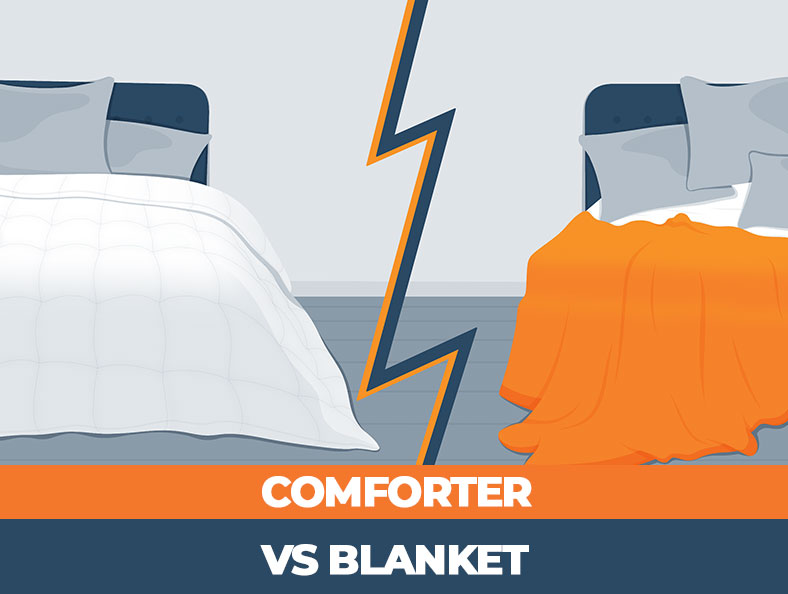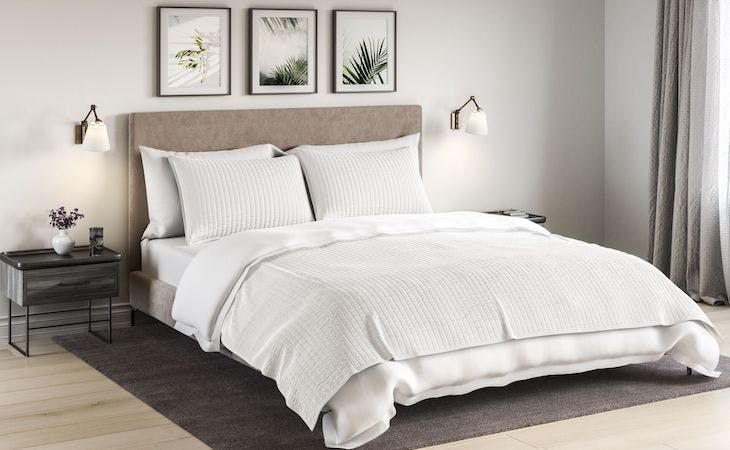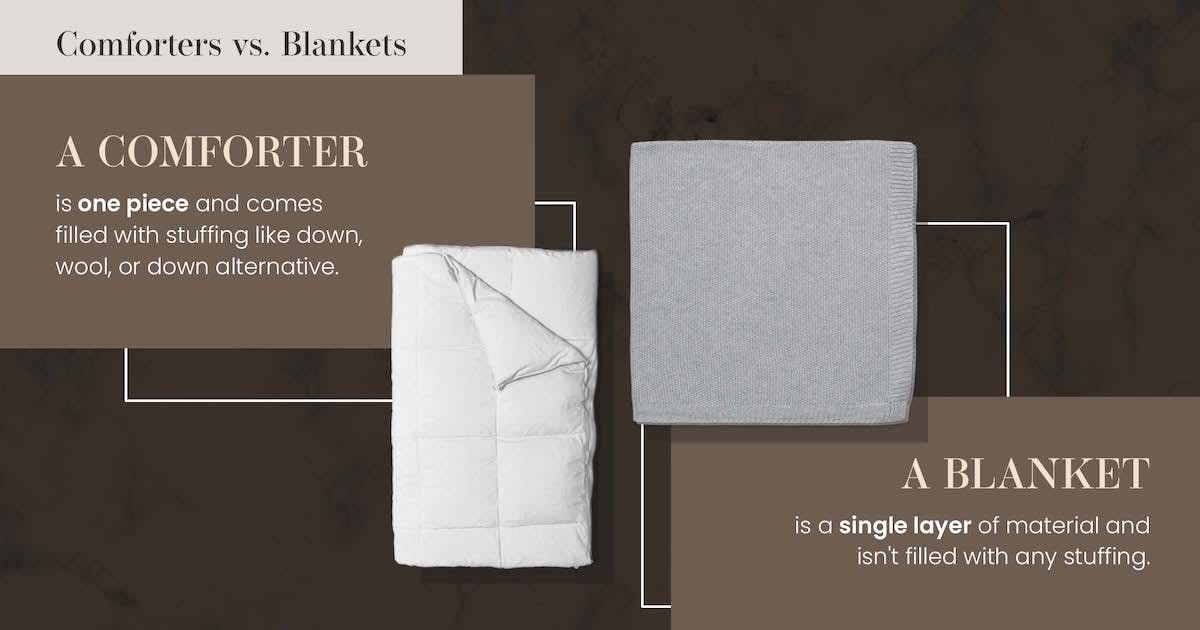Choosing between a comforter and a blanket might seem like a simple decision, but it can significantly impact your sleep quality and bedroom style. Imagine sinking into your bed after a long day, enveloped in the perfect layer of warmth and softness.
That’s the magic we’re exploring here. You want to make sure your choice not only suits your personal comfort needs but also complements your bedroom décor effortlessly. As you navigate this cozy conundrum, we’ll guide you through the key differences, helping you find the perfect bedding solution tailored just for you.
Let’s dive in and uncover which option will transform your sleep sanctuary into a haven of relaxation and style.
Material Differences
Choosing between a comforter and a blanket often depends on their materials. Each has unique qualities that affect comfort and warmth. Understanding the fabric differences helps you make an informed choice.
Types Of Fabrics
Comforters usually come in cotton or microfiber covers. These materials are soft and durable. They often have fillings like down, polyester, or wool. Down offers warmth and a fluffy feel. Polyester is affordable and easy to clean. Wool provides natural insulation.
Blankets often consist of wool, cotton, or fleece. Wool blankets are thick and warm. Cotton blankets are light and breathable. Fleece blankets are soft and cozy. Each fabric offers a different level of warmth and softness.
Breathability Factors
Breathability is key to a good night’s sleep. Cotton comforters breathe well, keeping you cool. Microfiber tends to trap heat, providing warmth in cold weather. Down fillings also breathe, regulating temperature effectively.
Blankets made from cotton are very breathable. Wool blankets offer warmth but can be less breathable. Fleece traps heat, making it cozy for colder nights. Choose based on your climate and personal comfort needs.

Credit: www.sleepadvisor.org
Warmth And Insulation
When it’s cold outside, you want your bed to be the ultimate cozy retreat. The right bedding can make a huge difference in how warm and comfortable you feel. Many people wonder whether a comforter or a blanket is better for warmth and insulation. Let’s dive into this topic, exploring how each option handles temperature regulation and seasonal suitability.
Temperature Regulation
Comforters are typically thicker and often filled with materials like down or synthetic fibers. This makes them excellent at trapping heat and keeping you warm.
Blankets, on the other hand, are generally thinner and made from materials like wool, cotton, or fleece. They tend to offer less insulation but can be layered for added warmth.
Have you ever found yourself tossing and turning because you’re too hot? Comforters can sometimes be too warm, leading to discomfort. A blanket offers more flexibility, allowing you to add or remove layers to suit your temperature needs.
Seasonal Suitability
Comforters are often designed for use in colder months. Their thick, insulated design makes them a great choice for winter.
Blankets are versatile and can be used year-round. In summer, a lightweight blanket can be just enough to keep you comfortable without overheating.
Think about your local climate. If you experience extreme temperatures, a comforter might be your go-to for winter, while blankets can offer comfort during milder seasons.
So, which is better for you? Consider how often your room temperature changes and whether you prefer adjusting layers or sticking with one cozy option. Your choice can greatly impact your sleep quality and overall comfort.
Weight And Feel
Choosing between a comforter and a blanket often boils down to how you prefer your bedding to feel. Do you like the embrace of a heavier comforter, or do you lean towards the airy lightness of a blanket? Understanding the weight and feel can help you decide what’s best for your restful nights.
Comforter Heaviness
Comforters tend to be heavier, providing a sense of security and warmth. Imagine wrapping yourself in a cloud that hugs you back. This heaviness can be a comforting presence, especially in colder months.
Some people love the weight because it feels like a gentle pressure that can ease anxiety and improve sleep. It’s almost like having a personal cocoon. Do you enjoy feeling snug and tucked in? A comforter might be just what you need.
Blanket Lightness
Blankets, on the other hand, offer a lighter touch. They’re perfect for those who prefer less bulk and a more minimalist feel. You can layer them easily, customizing warmth without the extra weight.
This lightness is ideal for warmer climates or if you tend to get hot at night. Blankets give you flexibility—add or remove layers as needed. If you value versatility and ease, a blanket could be your best bet.
Think about your own sleeping habits. Does the weight of your bedding influence your comfort? The choice between a comforter and a blanket is deeply personal, but understanding their distinct weight and feel can guide you to your perfect sleep solution.

Credit: www.saatva.com
Maintenance And Durability
Choosing between a comforter and a blanket involves understanding their maintenance and durability. Each bedding option has unique care requirements and longevity. This makes them suitable for different needs. Let’s explore how they differ in these aspects.
Cleaning Ease
Comforters often require more effort to clean. They are typically bulkier and need special attention. Most comforters need to be dry-cleaned or washed in large machines. This ensures they maintain their fluff and structure. Blankets, on the other hand, offer simpler cleaning. Many can be easily washed at home. Smaller size and lighter materials make them manageable in regular washing machines.
Longevity
Durability varies between comforters and blankets. Comforters, with proper care, can last for years. Their thickness and quality materials contribute to longer life. Blankets might wear out faster. Frequent washing can cause wear and tear. Yet, high-quality blankets can also be long-lasting. Selecting the right material can enhance their durability.
Aesthetic Appeal
The aesthetic appeal of bedding can transform a bedroom. Comforters and blankets each offer unique visual styles that suit different tastes. Whether you prefer a modern look or something traditional, both have options to enhance your space. Let’s explore the aesthetic aspects that make these bedding choices stand out.
Style Options
Comforters often have a plush, luxurious feel. They come with intricate stitching and patterns that add depth. This makes them a focal point in any room. Blankets, on the other hand, are simpler. They provide a clean and minimalistic look. You can layer them for a cozy vibe or keep it simple for a sleek design.
Color Choices
Comforters offer a wide range of colors. From bold prints to subtle hues, they cater to every palette. You can easily match them with your room’s theme. Blankets usually stick to solid colors. They offer classic shades like beige, gray, and navy. These colors blend seamlessly with different decors.

Credit: www.saatva.com
Cost Considerations
Choosing between a comforter and a blanket often involves cost considerations. Comforters generally cost more due to thicker material and added warmth. Blankets, being lighter, usually come at a lower price.
When you’re deciding between a comforter and a blanket, cost is a key factor to consider. Both options vary widely in price, and understanding these differences can help you make a more informed decision. Let’s dive into the financial aspects to see which option gives you the best bang for your buck.
Price Range
Comforters generally come with a higher price tag compared to blankets. You might find comforters ranging anywhere from $50 to over $200. This higher cost is often due to their thicker material and the additional layers they offer. On the other hand, blankets tend to be more budget-friendly. You can snag a decent blanket for as little as $20, although high-end options can go up to $100. Blankets are typically thinner, which contributes to their lower cost. Understanding these price ranges can help you set a realistic budget. Are you willing to invest more for the plush comfort of a comforter, or is a simpler, cost-effective blanket more your style?
Value For Money
When evaluating value for money, consider how often and in what conditions you’ll use your bedding. Comforters offer long-term durability and warmth, often lasting several years with proper care. If you live in a colder climate, spending more on a comforter might be worthwhile. Blankets, while more affordable, can be surprisingly versatile. They are perfect for layering in various seasons, adding a cozy touch without breaking the bank. If you prefer flexibility and change, a blanket might offer better value for your lifestyle. Think about your personal needs. Do you crave the luxury of a comforter, or do you value the practical, adaptable nature of a blanket more? Your choice will affect your wallet and your comfort, so weigh your options carefully.
Personal Preferences
Choosing between a comforter and a blanket often depends on personal preferences. Each person has unique needs and tastes. While some prefer the plushness of comforters, others lean towards the simplicity of blankets. Your decision might be influenced by various factors. Let’s explore these.
Individual Comfort Needs
Everyone’s comfort needs differ. Some enjoy the warmth of a thick comforter. Others prefer the lightweight feel of a blanket. Allergies can also play a role. Hypoallergenic comforters might be a better choice for sensitive individuals. Temperature sensitivity can influence your decision too. If you get hot easily, a light blanket might suit you best.
Lifestyle Factors
Your lifestyle can shape your choice between a comforter and a blanket. Busy individuals may prefer the ease of a comforter. It offers an all-in-one bedding solution. A blanket, on the other hand, is easier to clean. Frequent travelers might favor a blanket for its portability. Consider your daily routine and habits when choosing.
Frequently Asked Questions
What Is The Difference Between A Comforter And A Blanket?
A comforter is a thick, quilted bedding piece filled with down or synthetic fibers. It provides warmth and coziness. A blanket is a lightweight covering, typically woven or knitted, used for warmth. Comforters are often used as the top layer, while blankets can be layered for extra warmth.
Which Is Warmer: A Comforter Or A Blanket?
Comforters are generally warmer than blankets due to their thick filling. They provide excellent insulation, making them ideal for colder climates. Blankets, being lighter and thinner, offer moderate warmth. They are suitable for layering or use in milder weather conditions.
Can You Use A Comforter As A Blanket?
Yes, a comforter can be used as a blanket. It provides additional warmth and comfort due to its thickness. While comforters are typically used as top layers, they can also function as a standalone blanket, particularly in cooler weather.
How Do You Choose Between A Comforter And A Blanket?
Consider the climate, desired warmth, and personal preference. Comforters are ideal for colder temperatures and offer more warmth. Blankets are lightweight and versatile, suitable for layering or milder weather. Assess your needs and sleeping environment to make the best choice.
Conclusion
Choosing between a comforter and a blanket depends on your needs. Comforters offer warmth and thickness, perfect for colder nights. Blankets are versatile and lightweight, ideal for layering. Consider your climate and personal preference. Both options provide comfort, but serve different purposes.
Think about storage space and maintenance, too. Comforters require more care, while blankets are simpler to clean. Ultimately, comfort and convenience matter most. Find what suits your lifestyle best. Enjoy a cozy night’s sleep with your choice.
